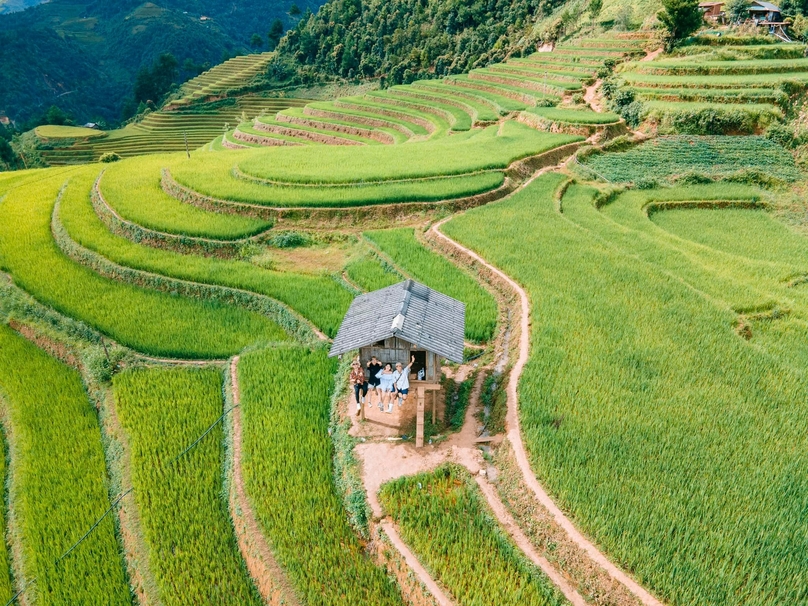Cultivating success in agritourism
The distinctive appeal of agritourism lies in the combination of natural and traditional cultural values in a rural setting. To ensure effective development, there needs to be an organized “servicescape” (the physical environment in which a service process takes place for agritourism activities), RMIT lecturer of tourism and hospitality management Dr Trang Pham writes.

The participation of local communities in agricultural tourism is particularly important. Local residents, intimately connected with their cultural environment and production methods, play a crucial role in organizing and sharing cultural values with tourists. They become the custodians and sharers of agricultural cultural values, contributing to the uniqueness of this tourist experience.
Balancing the interests among participants in agricultural tourism is also crucial. Local residents, tourism companies, and other stakeholders should mutually share economic, cultural, social, and environmental benefits.
Tourism activities have notably increased local incomes through services like homestays, guiding, performances, and the consumption of locally produced goods. Therefore, effective promotion and communication of destinations are vital for agricultural tourism. Building a brand for specific locations and agricultural products linked to their place of origin can contribute to the success.
One of the most crucial tasks is to avoid monotonous and repetitive products in agricultural tourism. Identifying key products and emphasizing the uniqueness of each locality is vital.
In Vietnam, given the small scale of agriculture, large farm tourism models may not be suitable. Future investments in agricultural tourism should focus on offering small-scale, refined, professional, and friendly services such as homestays and educational tours for school children.
Complementary products for agricultural tourism should aim to supplement services related to healthcare, healing foods, natural cosmetics, and spa experiences. This diversification enhances the overall tourism experience and caters to a broader range of visitor interests, while contributing to the sustainability and attractiveness of agricultural tourism in Vietnam.

Terraced rice fields in October in Mu Cang Chai district, Yen Bai province, northern Vietnam. Photo courtesy of Thanh Nien (Young People) newspaper.
Agritourism can adopt and embody many aspects of the green lifestyle, as successful models in other destinations such as Taiwan an Japan have shown. The Fairy Lake leisure farm in Taiwan, for example, integrates lychee and coffee cultivation with processing into high-value items. It aims to offer tourists safe dining options, comfortable accommodation, enjoyable recreational activities, and trustworthy shopping experiences.
Meanwhile, the community of Yufuin in Japan created the Yufuin Plus brand to promote locally produced organic items and reduce reliance on imports. Restaurants serve unique menus inspired by Western and Japanese cuisines, while tourist activities like cycling, train rides, and festivals showcase the local crafts, culinary arts, and agriculture. Community exchanges educate locals about tourism, encouraging participation. This integrated approach amplifies agricultural value and facilitates tourist engagement.
In Vietnam, the country’s embrace of agritourism marks a promising step towards rural development, cultural preservation, and economic sustainability. The nation's rich agricultural landscape and cultural heritage provide a fertile ground for immersive and educational experiences, contributing significantly to the broader tourism sector.
While challenges such as product development, service quality, and connectivity persist, different approaches offer pathways to overcome these hurdles. Emphasizing the combination of natural and cultural values, encouraging local community participation, and diversifying offerings can enhance the appeal of agritourism. By navigating these challenges and leveraging its unique strengths, Vietnam can position itself as a leader in sustainable and culturally enriched agritourism.
- Read More
Korean textile maker Panko Vina to shut Vietnam operations from Feb
Panko Vina Co Ltd, a South Korean textile manufacturer, will cease all production and business operations in Vietnam from February 1, 2026, ending more than 23 years of operations in the country.
Companies - Wed, December 24, 2025 | 9:13 pm GMT+7
Vietnam's garment giant Vinatex posts second-highest profit in 30 years despite trade headwinds
Vietnam National Textile and Garment Group (Vinatex), the country's top garment maker, expects consolidated profit to reach VND1,355 billion ($51.5 million) in 2025, the second-highest result in its 30-year history, despite mounting global trade and cost pressures on the industry.
Companies - Wed, December 24, 2025 | 5:03 pm GMT+7
Finding a new balance
The State Bank of Vietnam's proactive and flexible monetary policy in 2026 is expected to maintain market operations within a stable range. For businesses, particularly those in the external sector, it remains essential to proactively hedge against exchange rate and interest rate risks to protect their bottom line, writes Vu Binh Minh, associate director, FX Trading, MSS, HSBC Vietnam.
Consulting - Wed, December 24, 2025 | 4:47 pm GMT+7
Thai giant Central Retail sells Vietnam electronics business to Pico for $36 mln
Thailand’s Central Retail has announced the sale of its Vietnamese electronics retail business to local retailer Pico Holdings JSC for nearly THB1.14 billion ($36 million), as it sharpens its focus on core businesses in the country.
Companies - Wed, December 24, 2025 | 2:00 pm GMT+7
What should investors reasonably expect from IPO stocks?
Experience from both Vietnam and global markets shows that initial public offering (IPO) stocks rarely deliver immediate gains. However, investors who select companies with solid fundamentals and maintain a long-term holding strategy can be rewarded for their patience.
Finance - Wed, December 24, 2025 | 10:45 am GMT+7
Vingroup completes $325 mln overseas bond issuance
Vingroup, Vietnam's biggest listed company by market capitalization, has completed its international issuance of bonds totaling $325 million, with a 5-year maturity, and listed on Austria's Vienna Stock Exchange.
Finance - Wed, December 24, 2025 | 10:17 am GMT+7
Vietnam's public investment-linked stocks seen benefiting in 2026
Capital flows in 2026 are expected to favor sectors that stand to benefit from Vietnam’s public investment drive, including infrastructure, energy, and construction, market experts said.
Finance - Wed, December 24, 2025 | 9:33 am GMT+7
High gold prices to drive prices of property, goods in Vietnam: Sunhouse chairman
In a scenario where gold prices remain elevated in Vietnam, the real estate market is likely to follow suit, pushing income levels higher and driving up prices across other goods, said Nguyen Xuan Phu, chairman of Sunhouse, a leading home appliance manufacturer, while outlining his 2026-2030 forecast.
Economy - Wed, December 24, 2025 | 8:00 am GMT+7
Malaysia’s economy grows robustly in 2025: IMF
Malaysia has shown notable resilience amid global trade tensions and policy uncertainty, with its economy growing at a healthy pace this year, supported by strong domestic consumption and investment, solid employment growth, and a global upcycle in the technology sector, according to Masahiro Nozaki, Mission Chief for Malaysia at the International Monetary Fund (IMF).
Southeast Asia - Tue, December 23, 2025 | 10:07 pm GMT+7
Indonesia to stop rice imports next year
Indonesia will not import rice for either consumption or industrial use next year, citing sufficient domestic production, according to a government official.
Southeast Asia - Tue, December 23, 2025 | 10:04 pm GMT+7
Indonesia faces challenge of balancing wages, labor costs
Indonesia plans to raise minimum wages by about 5-7% in 2026 under a new formula signed into law by President Prabowo Subianto, a move that could test the country’s cost competitiveness in Southeast Asia.
Southeast Asia - Tue, December 23, 2025 | 10:00 pm GMT+7
Philippines extends sugar import ban
The Philippine Government has decided to extend its ban on sugar imports until the end of December 2026, as domestic supply has improved.
Southeast Asia - Tue, December 23, 2025 | 9:56 pm GMT+7
Duc Giang Chemical stock comes under heavy selling pressure as bottom-fishing shares return
DGC shares of Duc Giang Chemical Group JSC (DGC) closed Tuesday at VND71,600 apiece, down 4% from Monday which saw a 6.27% increase after four sessions of sharp declines last week.
Companies - Tue, December 23, 2025 | 9:49 pm GMT+7
Hanoi clears zoning for major mall project after Aeon exit, Thaco arm steps in
Hanoi authorities have approved a detailed zoning plan for an 8.03-hectare mixed-use site in Hoang Mai district, paving the way for a shopping mall-led development after Japan’s Aeon withdrew and a unit of Vietnam’s Thaco Group moved in.
Real Estate - Tue, December 23, 2025 | 5:05 pm GMT+7
Viettel Commerce partners with China’s Dreame Technology to expand home appliance ecosystem in Vietnam
Viettel Commerce and Import-Export Co. Ltd., one of the core pillars in trade and logistics of the military-run telecom giant Viettel, has signed a strategic cooperation agreement with China-based Dreame Technology, a global high-end technology brand, in Hanoi.
Companies - Tue, December 23, 2025 | 3:38 pm GMT+7
Former LPBank chairman becomes acting Sacombank CEO
Former chairman of Vietnamese private lender LPBank Nguyen Duc Thuy on Tuesday assumed the role of acting CEO at Sacombank, immediately after completing the handover at LPBank.
Banking - Tue, December 23, 2025 | 3:30 pm GMT+7
- Opinion























